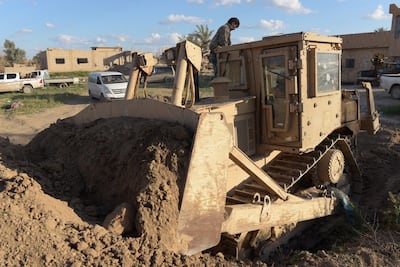Land mines and other explosive remnants of war killed and maimed a total of 34,208 civilians between 2004 and 2021 in Iraq, the Ministry of Environment said on Monday.
Iraq is considered one of the most explosive ordnance-contaminated countries in the world with land mines that can be traced back to the 1960s still posing a danger.
The mines are the deadly legacy of multiple conflicts on Iraqi soil, including military operations to quell the Kurdish rebellion in the 1960s and the 1980-88 Iran-Iraq war when Saddam Hussein’s regime planted them along the borders.
The first Gulf War in 1991 to expel Saddam’s army from Kuwait and the US-led invasion that toppled his regime in 2003 added more mines and unexploded ammunition, compounded further by the three-and-a-half year fight to expel ISIS from the north and west of the country.

Iraq has so far cleared more than 53 per cent of the 6,022-square-kilometre contaminated areas, the Environment Ministry’s spokesman Mustafa Hameed Majeed told The National, but 2,761 square kilometres are still contaminated.
Basra, which borders Iran, Kuwait and Saudi Arabia, is the area with the biggest concentration of unexploded ordnance, he said. It witnessed fighting during the Iran-Iraq war, the first Gulf War and the 2003 invasion.
Along the Iran-Iraq borders and major cities in northern and western Iraq that once were under control of ISIS are also in need of clearance.
“Along the land mines, there are unexploded ordnance such as cluster bombs, and there are still booby-trapped houses in areas taken back from ISIS,” Mr Majeed said.
As a signatory to Ottawa Anti-Personnel Mine Ban Treat since 2007, Iraq had an obligation to clear all of its landmines by 2018.
“But that deadline was extended to 2028 due to war with Daesh,” Mr Majeed add, using the Arabic acronym for ISIS. He said the government needs more time and more money to make affected areas safe again.

A variety of government departments and NGOs assist with the clearing operation, but all face challenges. It is difficult to clear areas with multiple types of ordinance in one place, or to safely destroy explosives in urban areas.
The lack of a centralised programme to clear ordnance has led to weak co-ordination between national authorities and local and international operators.
The mines have affected development, particularly in the oil, industrial and agriculture sectors, as so many mines were laid around major oil infrastructure and prime growing land.
The longer it takes, the more civilians fall victim. Authorities announce several incidents each month of civilians being either killed or maimed.
In a statement to condemn the killing of four children and maiming of two others in one week in early February, Unicef warned that explosive remnants of war continue to be “a primary reason for civilian casualties, with children being especially vulnerable.”
In 2021, 52 children were killed and 73 were maimed - a 67 per cent increase in child casualties from 2020.

